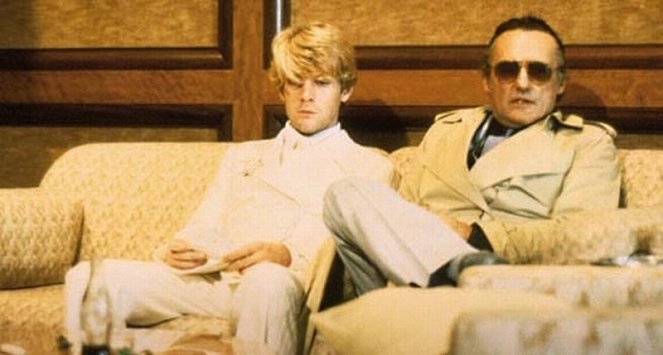Regie:
Roland KlickDrehbuch:
Roland KlickKamera:
Jürgen JürgesBesetzung:
Dennis Hopper, Terrance Robay, Ramona Sweeny, David Hess, Christian Brückner, Stefan Staudinger, Shaun Lawton, Ute Cremer, Cathy Haase, Klaus Voormann (mehr)Inhalte(1)
Ken Barlows Glanzzeit als Rock’n Roll Tour-Manager ist vorüber, doch seine großen Ideen vom Erfolg kann er nicht aufgeben. Und will er es noch mal wissen: der Musiker Moody ist seine letzte Chance und sein Opfer. Der Auftritt im verruchten Berliner Punk-Club wird zum Debakel, das in einer Straßenschlacht endet. Doch für Barlow ist der Abend ein voller Erfolg ist. Besessen von der Idee, dass im schnelllebigen Show-Geschäft nur Schlagzeilen zählen, egal ob gute oder schlechte, ist ihm für diese jedes Mittel recht. Die Situation eskaliert. (Verleiher-Text)
(mehr)Kritiken (2)
Dieses Bild stiehlt sich Dennis Hopper für sich selbst, der zwar eine wirklich von Kokain beflügelte, verrückte und verschwitzte Leistung zeigt, aber gleichzeitig kann man ihm auch wirklich erstklassiges, sensibles Schauspiel nicht absprechen. Es ist schwer, sich jemand anderen als ihn selbst in der Rolle des Kenneth Barlow, eines Musikproduzenten, der in einem fast zerfallenen Dunst seiner längst vergangenen Berühmtheit lebt, vorzustellen. Und obwohl es laut Regisseur Roland Klick eine absolute Hölle war, mit Hopper aufgrund seiner Drogenabhängigkeit zu drehen, wurde vielleicht letztendlich diese von Kokain angetriebene Raserei zu einem Mehrwert für diesen Film. White Star ist eine Charaktertragödie, deren Nachhall in mir nach dem Anschauen noch eine Weile bleibt.
()
White Star was supposed to be the peak of Roland Klick’s filmography, a major international project with a respected Hollywood actor in the lead role. Unfortunately for the director, however, that actor was Dennis Hopper. On the one hand, Hopper had become a renowned icon of American independent film thanks to Easy Rider (1969) and later confirmed his status as an actor in Mad Dog Morgan (1976), The American Friend (1977) and Apocalypse Now (1979). In Klick’s film, his role was to be that of a pragmatic promoter who tries to make a naïve musician a star using dubious methods. Hopper was enthusiastic about the project and later went so far as to say that it was his most personal part. This was in no small part due to Klick’s creative method, the essence of which consists in creating characters based on the actors and letting the actors merge with their respective characters and bring them to life with their own personality instead of conforming to strictly predefined roles. At the time, however, Hopper was at the absolute peak, or rather rock bottom, of his cocaine addiction, which meant that he not only had wild outbursts of emotion and sudden mood swings during filming, but that he mainly was actually usable for only about two hours a day. With an erratic lead actor and a limited shooting schedule, Roland Klick was forced to edit the script on the fly and come up with solutions for the lack of exposition to Hopper’s scenes that the actor was unable to perform. The result is a defective work, but at the same time, it is a fascinating cinematic phenomenon thanks to its impulsiveness, roughness, ellipticity and manic nature. It is necessary to recognise that, despite all of the circumstances of the filming, Klick managed to pull out of Hopper’s performance a relatively functional portrait of a self-absorbed and self-destructive maniac, which is even more meaningful today in the era of coked-up managers and the monstrous machinery of the PR industry. [written for the 2018 Summer Film School]
()


Werbung